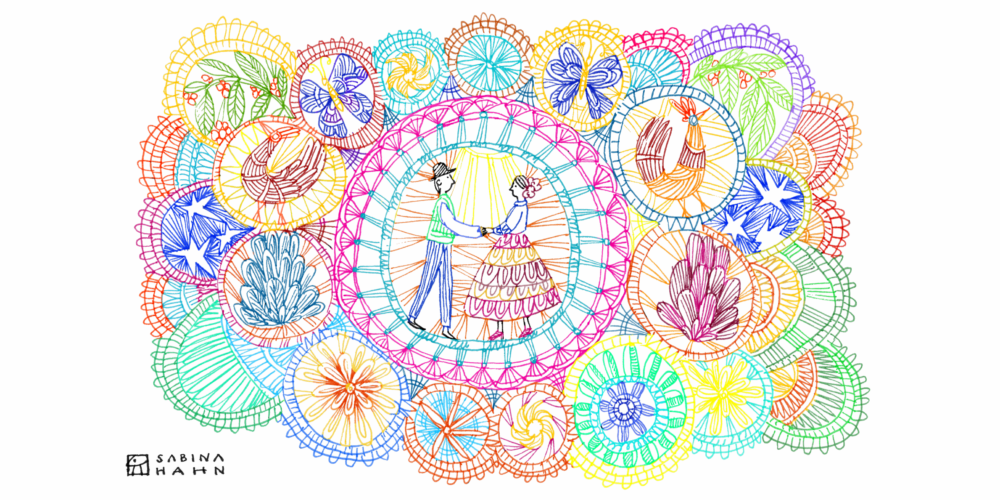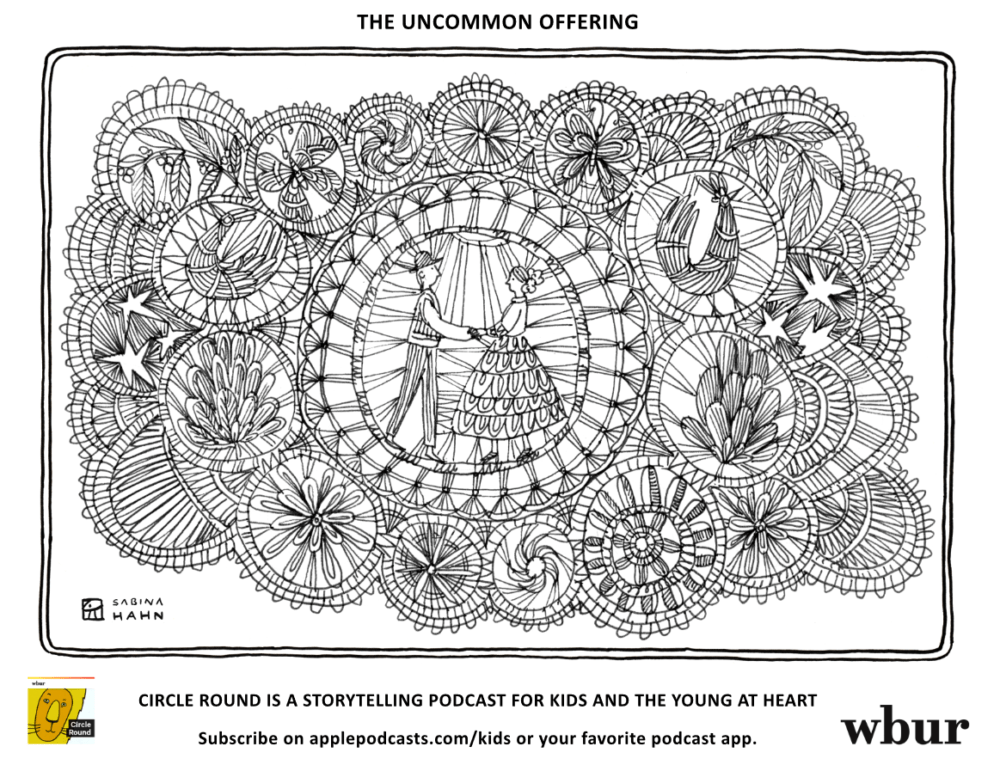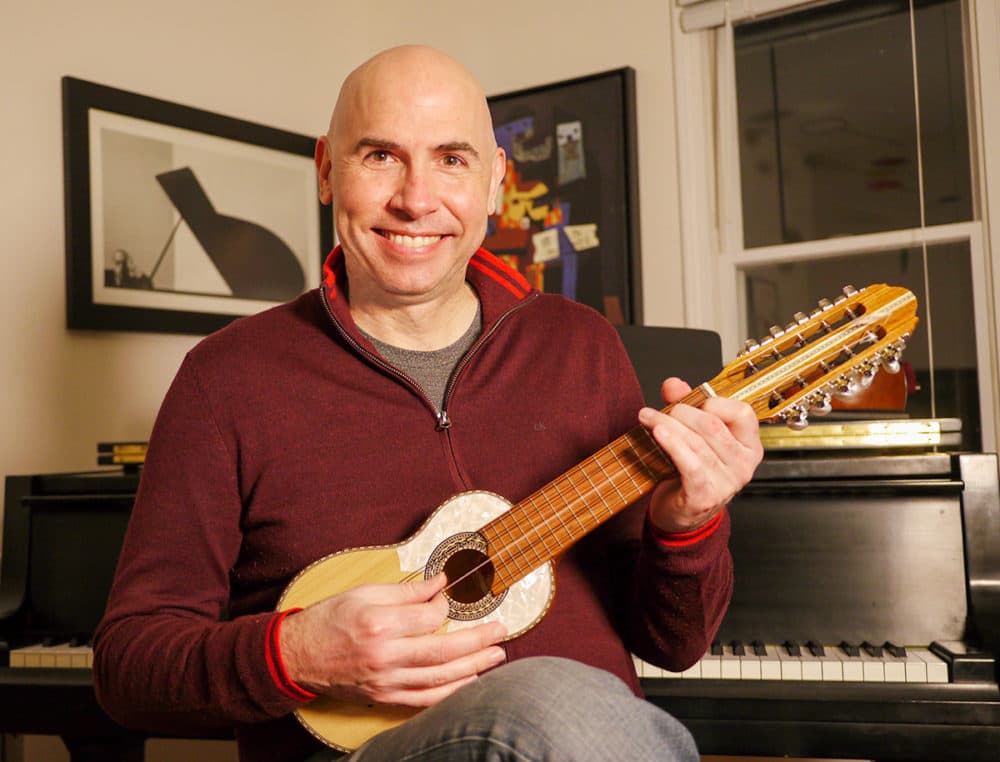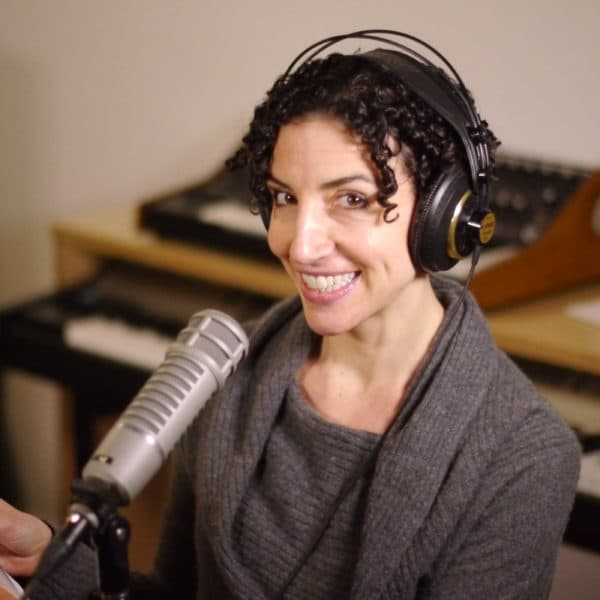Advertisement
'The Uncommon Offering' | Circle Round 125
Resume
Think about something you own that's really special to you.
What makes it special?
Maybe it's special because it's your favorite color... or it's fun to play with... or you find it to be really snuggly and comforting.
Or maybe it's because someone special gave it to you.
As we’ll hear in today's tale, those are the gifts that are priceless!
Voices in this episode include Elle Borders, Amy Brentano, Feodor Chin, Ryan Shrime, and Ruthie Ann Miles. In addition to gracing the stage in numerous Broadway and Off Broadway musicals, Tony Award winner Ruthie Ann stars in All Rise on CBS.
This episode was adapted for Circle Round by Rebecca Sheir. It was edited by Amory Sivertson. Original music and sound design is by Eric Shimelonis. Our artist is Sabina Hahn.
Coloring Page

ADULTS! PRINT THIS so everyone can color while listening. We’re also keeping an album so share your picture on Facebook, Twitter, Instagram, and tag it with #CircleRound. We'd love to see it! To access all the coloring pages for past episodes click HERE. Our resident artist is Sabina Hahn and you can learn more about her HERE.
Things To Think About After Listening
What does love mean to you?
How would you describe it?
Find a grown-up and describe to them what you think love means.
Have your grown-up write down your words, then send those words to us! You can even include a picture if you’d like. Our email address is circleround@wbur.org.
Musical spotlight: The Charango

This member of the lute family is popular in much of South America. Resembling a small guitar with a rounded back, the charango usually has ten strings in five double courses: i.e. each pair of strings plays the same note. The charango was originally made from the shell of the armadillo (for a legend about why, check out our story, "Armadillo's Song"), though modern charangos are typically made of various varieties of wood. A charango player is called a charanguista.
Script:
NARRATOR: Stroll through the markets and shops of Paraguay, and you’ll come across many an artist selling a particular kind... of lace.
It’s called ñandutí.
Ñandutí lace is round in shape, and it’s embroidered with all sorts of intricate designs and patterns that radiate out from the middle. When it’s done, the lace looks a lot like the wheel of a bicycle… the sun in the sky… or the web of a spider.
In fact, in the indigenous Guaraní language of Paraguay, ñandutí means “spider web”!
And in the story you’re about to hear, you’ll find out why.
It all began with a young man named Manu. Manu resided with his mother in a humble hut in the forest, where they lived off of rice and corn and not much else. Manu and his mother couldn’t afford a well, so each day the young man would rise with the sun, then carry a clay jar to the river to fetch fresh water.
One morning, as Manu knelt on the riverbank... poised to plunge his jar into the swift, cool current... he suddenly heard…
SPIDER: Help me!
NARRATOR: … a voice!
SPIDER: Please! Help me! Please!
NARRATOR: Manu swiveled his head this way and that.
MANU: Who’s that talking? I don’t see anyone here! How can I help you if I can’t see you?
SPIDER: That’s because you’re looking too high! Look down! Down!
NARRATOR: So Manu looked down. And there… clinging to a rock protruding from the surging water... was a tiny white spider!
SPIDER: Now do you see me? (beat) I was spinning a web on that bush over there, and somehow I tumbled into the river! I managed to climb onto this rock, but now I’m stranded! The current is so very powerful and I am so very small… can you please lift me out?
NARRATOR: Manu’s heart immediately went out to the tiny, struggling creature. Without missing a beat, he plunged his hand into the water, scooped up the spider, and placed her in a bush covered with broad green leaves and small white flowers.
MANU: There you go, Spider! Now you’re as safe as can be!
SPIDER: Oh, thank you! Thank you! I thought for sure I was a goner! (beat) Tell me… what’s your name, young man?
MANU: Manu…
SPIDER: Manu, you were kind enough to save my life. And for that, I’ll be forever grateful. (beat) Tell me — how can I... repay you?
MANU: “Repay” me?
NARRATOR: Manu’s lips curled into a grin.
MANU: There’s no need to “repay” me, little one! I saved your life because you were in trouble. I don’t need anything in return.
SPIDER: Very well then. (beat) But if you ever change your mind, Manu… you know where to find me!
NARRATOR: And with that, the spider scuttled across the bush and set to work building her web. Manu watched with admiration and awe as the nimble creature shot strand after strand of glittering silk from her spinnerets [emphasis on final syllable]. Then she began weaving a delicate, circular pattern. Round and round the spider went, spinning and spinning, drawing Manu into a sort of hypnotic reverie.
But then…
[SOT: canoe paddling]
NARRATOR: ...a sound from up the river brought him back to earth.
Manu turned his head and spied a canoe... a fine, sleek vessel carved from the thick trunk of a mighty tree. Paddling the canoe was a young woman wearing a white dress with a purple sash. Her dark hair was coiled in braids and interlaced with bright purple orchids. Her brown eyes were flecked with gold and sparkling like sunbeams.
As the canoe cut through the water, moving closer and closer, Manu felt his heart thump in his chest. He lifted his hand and gave a little wave. The young woman waved back. Then she flashed Manu a smile as bright as the sky, before disappearing down the river.
Manu felt his hands shake as he filled his clay jar with water; the image of the mysterious young woman kept dancing around in his brain. When he was done, he raced home and asked his mother if she knew who the stranger in the canoe might be.
MOTHER: Oh! That must have been Ana! She’s the daughter of the chief, one village over.
MANU: (clearly in love) Ana…
MOTHER: That’s right! Ana moved in with her aunt when her mother passed away, but now that she’s older, she’s come back home to live with her father.
MANU: (lost in love/thought) Ana…
MOTHER: Yes. (beat) (knowing) She seems to have made quite the impression on you, huh…?
NARRATOR: Indeed, she had. Manu spent the rest of the day thinking about Ana — the whole night, too. And the next morning, he woke up extra early, grabbed his clay jar, and ran to the river faster than he ever had before. On the way, he picked as many bright purple orchids as he could find, and placed them in a basket.
A little while later...
[SOT: canoe paddling]
NARRATOR: ...Manu heard a sound that made his heart do a flip. It was Ana! And she was paddling her canoe his way!
Only this time, Manu did more than wave and smile. He mustered up his courage, took a deep breath, and…?
MANU: (working up courage, but still nervous) Um, good morning!
NARRATOR: Ana fixed her twinkling brown eyes on Manu. Then she shifted the direction of her canoe and came gliding to the water’s edge. With a graceful leap, she hopped out of the canoe and landed on the riverbank, right in front of Manu.
ANA: (playfully mocking him) “Um, good morning” to you, too! (beat) Did I see you here yesterday?
NARRATOR: Manu’s heart was beating so quickly, he thought for sure it would sprout two little wings and flutter away.
MANU: (nervous) You did see me. My name is water, and I come here every morning to collect Manu. (catching himself) I mean, my name is Manup, and I come here every morning to collect water. (little flustered sigh)
NARRATOR: Ana smiled.
ANA: Well, it’s a pleasure to meet you, Manu. I’m Ana. (beat) What’s in the basket?
MANU: (totally blanking) The basket…!??
NARRATOR: Manu was so nervous he’d already forgotten about the orchids! Flustered, he held out his basket.
MANU: (still nervous) These are orchids! I picked them! For you! Yesterday I noticed you were hairing them in your wear — I mean wearing them in your hair, so… (little flustered sigh)
NARRATOR: Again, Ana smiled.
ANA: Well, thank you, Manu. Orchids are my absolute favorite. (beat) I wonder, are you busy right now? I was heading this way to collect guavas and papayas. This forest has the most amazing fruit trees! (beat) Care to join me?
NARRATOR: Manu and Ana spent all morning picking fruit from the forest. They talked, they joked, they laughed. Manu had never felt so comfortable around another person, and he suspected Ana felt the same way.
Manu and Ana began meeting by the river every morning. Sometimes they would pick fruit, sometimes they would paddle around in the water. But always they would talk, joke, and laugh, for hours and hours and hours.
Before long, they were professing their love. But when Ana brought Manu back to her village to meet her father…
CHIEF: This is the young man you wish to marry…?!?
NARRATOR: ...the chief put his hands on his hips and scowled.
CHIEF: Come now, Ana! He’s a peasant! A commoner!
NARRATOR: Manu felt his cheeks burn.
MANU: With all due respect, sir… I may not be the chief of a son — I mean, the son of a chief — but I love Ana. And she loves me. We wish to be together forever.
ANA: It’s true, Father!
NARRATOR: Ana threw her arms around Manu.
ANA: We wish to be together forever!
NARRATOR: The chief gazed at the young couple. From the looks on their faces, he knew they were very much in love.
But he also knew the rules.
CHIEF: Listen, you two. The daughter of a chief can’t marry just anyone! She is nobility! She is royalty! According to tradition, she must marry someone who can provide her with precious things! Rare things! Someone who can offer her treasures so uncommon, you can’t possibly calculate the cost!
NARRATOR: The chief laid a hand on Ana’s shoulder.
CHIEF: Dearest daughter... if you wish to get married, we must find someone suitable for you! Someone worthy! (beat) (gets an idea) And I will help! Tomorrow I will invite all the young men in the land to come to our village and bring you something precious, something rare. (beat) Whoever succeeds in bringing you the most uncommon offering… he will win your hand in marriage.
ANA: But, Father! Can’t you see that I — (gets interrupted)
CHIEF: (interrupting her) No “buts,” my dear! My decision has been made. (beat) (stern) The competition begins tomorrow. (slowly, dramatically) May the best man win!
[theme music in]
NARRATOR: What do you think will happen next?
Does Manu stand a chance of winning the chief’s competition?
We’ll find out, after a quick break.
[theme music out]
[MIDROLL]
[theme music in]
NARRATOR: Welcome back to Circle Round. I’m Rebecca Sheir. Today our story is called “The Uncommon Offering.”
[theme music out]
NARRATOR: Before the break, the chief announced a competition: whoever could bring his daughter, Ana, the most precious, rare and uncommon offering would win her hand in marriage.
Ana was already in love with a humble young man named Manu. Manu barely had a penny to his name. And as he headed back to his village after meeting the chief, he felt like dark clouds were swirling over his head.
MANU: Oh, what am I going to do? I love Ana with all my heart, and she loves me... But dozens of princes and warriors will show up tomorrow bearing fancy gifts, expensive gifts, gifts that I can only dream of! (beat) And what can I offer? Little more than the clay jar I use to fetch water from the river each morning!
NARRATOR: Manu slumped his shoulders.
MANU: I’ll just have to face it. Ana and I will never be together again.
NARRATOR: As Manu trudged on, he felt a lump form in his throat. Soon his eyes were so misty with tears he could hardly see. When he reached the river, he collapsed on a rock, put his head in his hands, and let out a sob.
MANU: (ad-lib crying)
NARRATOR: But then…
SPIDER: Manu?
NARRATOR: … he heard a voice! A tiny, familiar voice, coming from a bush with broad green leaves and small white flowers.
SPIDER: Manu! Why the tears? (beat) What troubles you, my friend?
NARRATOR: Manu wiped his eyes and peered at the bush. Poised on a silky web glistening with dew… was the spider! The little white spider that Manu had rescued from the river all those months ago — the same day he’d first caught sight of Ana drifting in her canoe!
Manu took a breath and told the spider everything that happened... starting with his initial encounter with Ana and ending with her father’s seemingly impossible challenge.
SPIDER: Hmmmm… so you’re telling me the chief wants Ana’s suitors to bring her a precious offering…? Something rare…? Uncommon…?
MANU: That’s right! And how can a common guy like me find something like that?
NARRATOR: The spider gazed at Manu with all eight of her bright, bulbous eyes.
SPIDER: Listen, Manu. Back when you and I met, I told you I wanted to repay you for saving my life. Perhaps now I can finally — (gets distracted)
NARRATOR: The spider stopped short. A bright green aphid had wandered into the web and gotten stuck fast. Before you can say “lunch is served,” the spider darted over to the hapless insect and wrapped its wriggling body in a bundle of silk. Then she scurried back to Manu.
SPIDER: As I was saying… when you pulled me out of the river, Manu, I wanted to do something to show my gratitude. Now I’ve finally found my chance! (beat) Come back to this bush first thing tomorrow, and I promise — you’ll be well on your way toward winning the chief’s contest.
NARRATOR: Manu didn’t sleep a wink that night. He tossed and turned for hours, his head swirling with visions of the treasures Ana’s suitors would bring. Sparkling jewelry, hand-carved statues, exotic birds with feathers of every color... How could a tiny white spider possibly compete with that?
As the first rays of sun edged over the horizon, Manu pulled himself out of bed and trudged down to the river. The forest was especially quiet, and the air was heavy with mist.
When Manu reached the broad-leafed bush with the small white flowers, he found the spider waiting. He noticed her web was gone. Instead, she was perched on a leaf.
SPIDER: Good morning, Manu! The chief’s giving everyone until sundown to present their gifts to Ana. So whaddya say we get cracking?!?
NARRATOR: Manu watched as the spider began dancing about on her eight little legs. The tiny creature wiggled this way and that, and began... to spin a web.
The spider scuttled to and fro, back and forth, spinning strand after strand of fine, slender thread. She spun the silk around and around in a circle, weaving in all sorts of designs and patterns — suns and stars, clouds and rainbows, butterflies and birds.
Hours passed. The web grew bigger, and Manu’s eyes grew wider. Eventually, the spider had woven a web the size of a shawl... its great expanse of shimmering silk sparkling in the mid-afternoon sun.
After a while, the spider paused, as if surveying her work. Then she crawled to the very center of the web and began spinning faster than ever. And when at last she came to a stop…
MANU: (amazed) Woooowwwww!
NARRATOR: ...Manu’s jaw dropped. For in the middle of the web what did he see… but an orchid. A delicate, dazzling, silver orchid — Ana’s favorite flower.
SPIDER: Alright, Manu. Take this web to Ana. Show her your treasure. Show her your love.
NARRATOR: Manu could hardly find words to thank the spider. Beaming from ear to ear, he detached the glittering web from the bush, then took off running.
Before long, he joined a procession of men parading toward Ana’s village. As Manu and his fellow suitors walked, he noticed the exotic treasures they had brought — necklaces dripping with diamonds, goblets made of silver and gold, massive chests carved from the rarest of wood.
When the suitors reached the village, all of Ana’s neighbors were mulling around outside, eager to watch the contest.
In the middle of the crowd, standing tall with his burly arms crossed in front of his burly chest, was the chief.
Sitting beside him was Ana, looking more beautiful than ever… and, Manu thought, more brokenhearted than ever. She was slouched in her chair, with her shoulders slumped and her eyes dull.
One by one, the young men laid their offerings at Ana’s feet. At the sight of each new treasure, the chief would turn to his daughter and say…
CHIEF: Isn’t that marvelous?!?
NARRATOR: ...or…
CHIEF: Isn’t that exquisite?!?
NARRATOR: ...or…
CHIEF: Isn’t that spectacular?!?
NARRATOR: ...but Ana would just sigh and say nothing.
At last, Manu reached the front of the line. He took a breath, then lifted his trembling hands and held up his offering… the glistening gossamer shawl... the very first piece of nandutí lace the world had ever seen.
As the delicate silky threads caught the rays of the sun, the shawl began to glow… and Ana’s eyes began to twinkle! A smile radiated across her face as she beheld the stars and rainbows, the butterflies and birds, and, of course, the dazzling orchid.
And then, as Manu bent down to lay the shawl over Ana’s shoulders, she sprung from her seat, wrapped her arms around Manu, and gave her beloved a warm, passionate kiss.
As the couple embraced, the other suitors grumbled with envy. The villagers cheered with joy. And as for Ana’s father, the chief... he made an announcement.
CHIEF: (humbled, happy) Ladies and gentlemen, we have a winner! Manu has brought the most uncommon offering of all!
NARRATOR: And so he had.
But what was that “offering”?
Was it the shimmering, silken shawl of lace...?
Or was it true love...?
I’ll leave it to you to decide.
